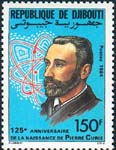|
|
Physicist / Astronomer Stamps
|
C
Born: 13 May 1753 in Nolay, Burgundy, France
Died: 2 Aug 1823 in Magdeburg, Prussian Saxony (now Germany)

More a mathematician, Carnot's interests in his last years turned toward the steam engine with the first steam engine coming to Magdeburg in 1818. His son
Born: 14 June 1736 in Angoulême, France
Died: 23 Aug 1806 in Paris, France

Biography


1903 Nobel Physics prize in recognition of the extraordinary services they (Marie and Pierre) have rendered by a joint research on the radiation phenomena discovered by Professor Henri Becquerel.
She was the first woman to win a Nobel Prize — she actually won it twice — and the first woman to earn a doctorate in Europe. Her investigations led to the discovery of radioactivity as well as the element radium. The word "radioactive" was first used by Marie Curie to describe her observations, as published in Comptes Rendus.

1903 Nobel Physics prize in recognition of the extraordinary services they (Marie and Pierre) have rendered by a joint research on the radiation phenomena discovered by Professor Henri Becquerel. Pierre Curie besides his work in radioactivity, was the discoverer of piezoelectricity. He also observed that permanent magnets lose their magnetic properties when heated above a critical temperature, which is called the Curie temperature.
-
Curie Irene
Irene (1897-1956) and Frederic Joliot-Curie (1900-1958), daughter and son-in-law of the Curies, continued the study of radioactivity, producing artificial radioisotopes by alpha bombardment of aluminum and other light nuclei, and also shared a Nobel Prize in chemistry for this work. Frederic continued research on uranium fission and the accompanying production of neutrons. He became the leader of the French atomic energy program. After World War II, he had a deep concern for world peace, becoming the first president of the World Council for Peace.
Biographies of Physicists and Astronomers
|
|




